Squamous Cell Carcinoma
Understanding and Preventing Squamous Cell Carcinoma (SCC)
The Prevalence of Squamous Cell Carcinoma - A Common Skin Cancer
Squamous cell carcinoma (SCC) is the second most common form of skin cancer. It typically develops on sun-exposed skin, including but not limited to the head, neck, ears, lips, arms, legs, and hands. Prolonged exposure to ultraviolet (UV) radiation from the sun or tanning beds increases the risk of developing SCC.
Importance of Regular Skin Checks
Regular skin checks performed by a dermatologist at The Dermatology & Skin Surgery Center of Wilmington are crucial in detecting Squamous Cell Carcinoma (SCC) early. Our expert dermatologists have the expertise to recognize suspicious lesions, growths, or changes in the skin that may indicate SCC. Equally essential are self-exams, allowing individuals to monitor their skin for any evolving or unusual areas, such as persistent sores, rough patches, or raised nodules.
Early Detection and Treatment
By combining professional assessments with self-examinations, early identification of potential SCC lesions becomes more achievable. Early detection significantly enhances treatment success rates and improves overall outcomes for SCC, emphasizing the importance of routine checks by dermatologists and self-exams in maintaining optimal skin health.
Comprehensive Care at The Dermatology & Skin Surgery Center of Wilmington, NC
At The Dermatology & Skin Surgery Center of Wilmington, your skin's well-being is our top priority. Our team of skilled professionals is dedicated to supporting you and your family at every stage of your skin health journey. We’re committed to providing exceptional care and guidance, ensuring a comprehensive and personalized approach to your skin wellness needs.Whether you require treatment for SCC or other skin conditions, our expert providers offer advanced diagnostic techniques and customized treatment plans to ensure the best possible outcomes. Schedule your appointment to take proactive steps in safeguarding your skin’s health and achieving peace of mind.
Examples of Squamous Cell Carcinoma
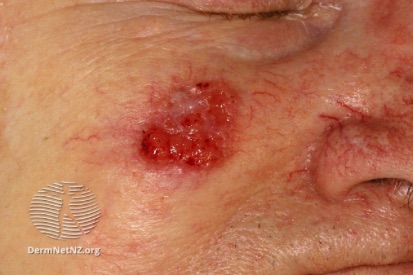
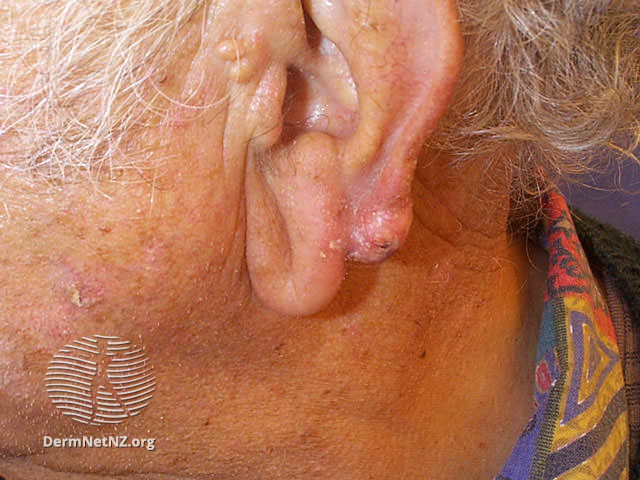
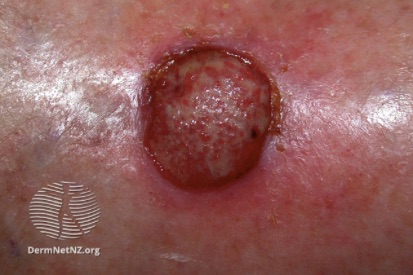
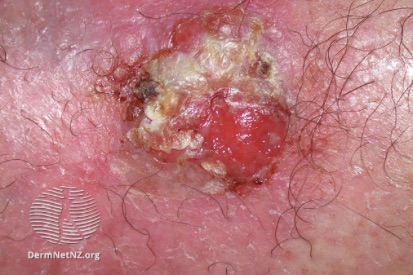
Symptoms of Squamous Cell Carcinoma
- Squamous cell carcinoma usually begins as a dome-shaped bump or a red, scaly patch of skin.
- Rough and crusty and can bleed easily when scraped.
- Changes in existing growths: changes in the appearance of existing skin growths, such as warts or scars.
- Persistent sore: a sore or lump that doesn't heal, or a lesion that keeps recurring.
What Causes Squamous Cell Carcinoma?
- Squamous cell carcinoma (SCC) can affect individuals across diverse backgrounds.
- It is more prevalent in those with regular exposure to direct sunlight, especially in professions or lifestyles that involve significant sun exposure.
- While skin cancer is less common in individuals with darker complexions, they are at an increased risk for SCC in areas of the body not typically exposed to the sun.
Squamous Cell Carcinoma Prevention
Squamous Cell Carcinoma FAQs
Diagnosis involves a biopsy, where a sample of the suspicious area is removed and examined under a microscope. This helps confirm whether the lesion is cancerous and provides information about its characteristics
Treatment options for SCC depend on factors such as the size, location, and stage of the cancer. Common treatments include surgical excision, electrodessication and curettage, cryotherapy, Mohs surgery for more complex cases, radiation therapy, and topical medications.
The frequency of screenings depends on individual risk factors. High-risk individuals, such as those with a history of SCC or other skin cancers, may need more frequent screenings. Consult with your dermatologist to determine the appropriate screening schedule for your situation.
While SCC is usually slower-growing than melanoma, it has the potential to be locally aggressive and may spread to other parts of the body, especially if left untreated. Early detection and treatment are important for preventing complications.
A total body skin exam by a dermatologist is crucial for several reasons. Firstly, it serves as a proactive measure for the early detection of skin cancers, including melanoma, the deadliest form of skin cancer. Skin cancers are often highly treatable when identified at an early stage. A comprehensive examination allows the dermatologist to assess moles, birthmarks, and any unusual skin changes that may indicate potential issues.
Secondly, a dermatologist can identify and diagnose various skin conditions, including dermatitis, psoriasis, and infections. Early detection and treatment of these conditions can prevent them from escalating into more serious health issues.
Furthermore, a total body skin exam provides an opportunity to discuss and address any concerns or questions about skin health, sun protection, and skincare routines. Dermatologists can offer valuable guidance on skin cancer prevention, emphasizing the importance of sun protection measures, such as wearing sunscreen and protective clothing.
Regular skin exams become especially vital for individuals with risk factors, such as a family history of skin cancer, a personal history of sun exposure, or fair skin. Overall, a total body skin exam is a proactive and comprehensive approach to maintaining skin health, preventing skin cancers, and addressing any skin-related issues in a timely manner.
You should apply sunscreen every day. Even on cloudy days and during the winter, UV rays can penetrate the clouds and cause skin damage.
Sunscreen needs time to be absorbed into the skin. Apply it at least 15-30 minutes before going outdoors and reapply every two hours.
From Our QualDerm Family of Brands: Non-Melanoma Skin Cancers
Treatment Options for Squamous Cell Carcinoma
- Mohs micrographic surgery
- Excisional surgery
- Cryotherapy (freezing)
- Currettage and Electrodessication
- Chemotherapy
- Radiation
Featured Blogs

- Skin Cancer
- General Dermatology
- Skin Exams
Have you noticed a new spot pop up on your skin or a mole that has changed a little bit over time? Though many individuals have spots, moles, and patches of skin that may look completely harmless, skin cancer can often be sneaky and show up in ways you may not expect.
Read More
- Skin Cancer
- General Dermatology
- Skin Exams
Read The Dermatology & Skin Surgery Center of Wilmington’s helpful basal cell carcinoma guide to learn what this skin cancer is, where it begins, how it shows up on the skin, risk factors, and how we treat basal cell carcinoma in Wilmington.
Read More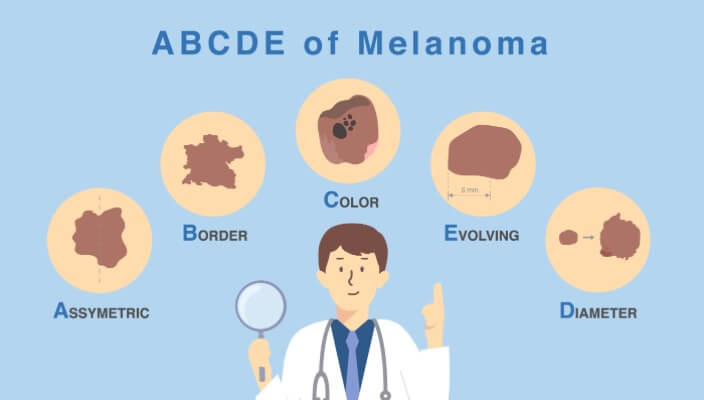
- Skin Cancer
- Skin Exams
With skin cancer cases rising year after year, it’s no surprise that people are itching to learn more about this life-threatening skin disease
Read MoreFeatured Products for Sun Protection

Bright+Block SPF 47 Mineral Sunscreen for Face and Body
Bright+Block SPF 47 mineral sunblock provides broad-spectrum UVA & UVB coverage through chemical-free active ingredients: Zinc oxide and Titanium Dioxide. This formulation goes on white to ensure complete coverage yet disappears completely, protecting skin from the sun’s damaging rays. Lightweight and water-resistant (80 minutes), this sunscreen works beautifully for all skin types. 4.9 OZ (139 G)

EltaMD UV Sport SPF 50 3oz, 7 oz
Have your fun in the sun – but play it safe. This sunscreen is great for swimmers, skiers, runners, golfers and other athletes – or for those who just love to be outdoors! UV Sport is water-resistant, so it won’t rinse off in water or drip into your eyes and sting when you sweat.
